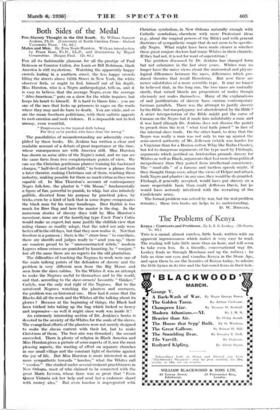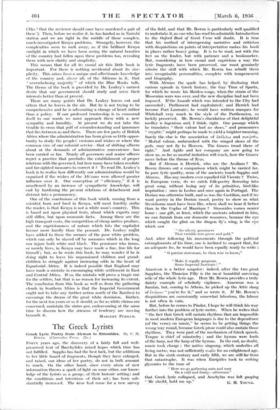The Problems of Kenya
Kenya : Contrasts and Problems. By L. S. B. Loakoy. (Methuen. 7s. 6d.)
Tins is a casual, almost careless, little book, written with an apparent ingenuousness which makes it very easy to read. The reading will take little more than an hour, and will seem to take even less. In a friendly, conversational way Dr. Leakey leads us through Mombasa and up the railway ; he bids us close our eyes and visualise Kenya in the Stone Age, and open them to see the beauties of Kenya today, to admire the little hyrax in its tree and the bat-cared foxes in their hole. (Alas ! that the reviewer should once have murdered a pair of , these !) Then, before we realise it, he has landed us in Nairobi station and we are right in the middle of those complex, much-investigated Kenya problems. Strangely, however, the complexities seem to melt away, as if the brilliant Kenya sunlight in which we have been seeing the natural beauties of the country had fallen upon these problems too, revealing them with new clarity and simplicity.
This means that for all its casual air this little book is important. For there is nothing accidental about its sim- plicity. This arises from a unique and affectionate knowledge • of the country and, above all, of the Africans in it, that " overwhelming majority " of which the Blue Books talk. The theme of the book is provided by Dr. Leakey's earnest desire that our government should study and serve their interests better than at present.
There are many points that Dr. Leakey leaves out and others that he leaves in the air. But he is not trying to be comprehensive and he is advocating a change of heart rather than a policy. If our professed trusteeship is to commend itself to our wards we must approach them with a new sympathy and humility. At present we do not take the . trouble to cross that gulf of misunderstanding and ignorance that lies between us and them. There arc few parts of British Africa where the administration has been given so little oppor- tunity to study the peoples' customs and wishes or where the common vice of our colonial service—that of shifting officers about at the demands of administrative convenience--has been carried so far. Nearly all governors and senior officers regret a practice that precludes the establishment of proper relations with the governed, but how many have taken resolute and far-sighted measures to correct it ? To read Dr. Leakcy's book is to realise how differently our administration would be organised if the wishes of the Africans were allowed greater influence over it. Our conception of " efficiency," if it is unsoftened by an increase of sympathetic knowledge, will end by hardening the present relations of detachment and distrust into a permanency.
One of the conclusions of this book which, coming from a scientist born and bred in Kenya, will most forcibly strike the reader, is that Kenya is not a white man's country. This is based not upon physical tests, about which experts may still differ, but upon economic facts. Among these are the high transport costs, the competition of cheap native produce, and the capriciousness of nature which hits the capitalist farmer more hardly than the peasant. Dr. Leakey might have added to these the menace of the poor white problem, which can only be staved off by measures which in the long run injure both white and black. The pensioner who farms, or merely lives, in Kenya may have made a fine, free life for himself ; but, as he reads this book, he may wonder if he is doing right to leave his unpensioncd children and grand- children to struggle against increasing odds in the heart of Equatorial Africa. It is indeed possible that England may have made a mistake in encouraging white settlement in East and Central Africa. It' so, the mistake will prove a tragic one for the settlers, but that is no reason for increasing its extent. The conclusion from this book as well as from the gathering clouds in Southern Africa is that the Imperial Government ought not to take any further action north of the Zambesi to encourage the dream of the great white dominion. Rather, for the next ten years or so it should,'as far as white claims are concerned, maintain the status quo, endeavouring at the same time to discern how the streams of tendency are moving

















































 Previous page
Previous page